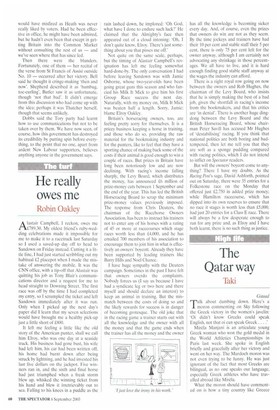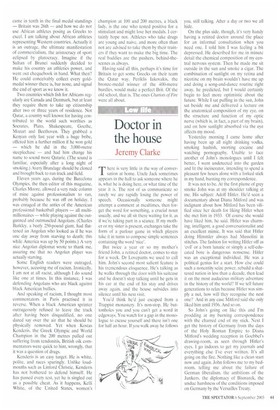The Qatar way
Taki
Gstaad
Talk about dumbing down. Here's a moron commenting on Sky following the Greek victory in the women's javelin: 'Oi didn't know Greeks could speak English, not that oi can speak Greek . .
Mirela Manjani is an articulate young Greek woman who won the gold medal in the World Athletics Championships in Paris last week. She spoke in English briefly and gracefully after her victory and went on her way. The Murdoch moron was not even trying to be funny. He was just ignorant of the fact that most Greeks are bilingual, as no one speaks our language, especially Greek athletes who have travelled abroad like Mirela.
What the moron should have commented on is how a tiny country like Greece came in tenth in the final medal standings — Britain was 26th — and how we do not use African athletes posing as Greeks to excel. I am talking about African athletes representing Western countries. Actually it is an outrage, the ultimate manifestation of commercialism, the aristocracy of sport eclipsed by plutocracy. Imagine if the Sultan of Brunei suddenly decided to make his country an athletics power, and went out chequebook in hand. What then? He could conceivably collect every goldmedal winner there is, bar none, and signal the end of sport as we know it.
Two countries which fish for Africans regularly are Canada and Denmark, but at least they require them to take up citizenship after two or three years of residence. Not Qatar, a country well known for having contributed to the world such worthies as Socrates, Plato, Shakespeare, Goethe, Mozart and Beethoven. They grabbed a Kenyan only last year with a huge bribe, offered him a further million if he won gold — which he did in the 3,000-metre steeplechase — and had him change his name to sound more Qataric. (The sound is familiar, especially after a long night of smoking.) Avery Brundage should be cloned and brought back to run track and field.
Eleven years ago, during the Barcelona Olympics, the then editor of this magazine, Charles Moore, allowed a very rude column of mine against professionalism to run, probably because he was off on holiday. I was enraged at the antics of the American professional basketball players — all multimillionaires — while playing against the outgunned and outmuscled Angolans. (Charles Barkley, a beefy 250-pound giant, had flattened an Angolan who looked as if he was one day away from starving to death; this while America was up by 50 points.) A very nice Angolan diplomat wrote to thank me, assuring me that no Angolan player was actually starving.
Some English readers were outraged, however, accusing me of racism. Ironically, I am not at all racist, although I do sound like one at times. In this instance, I was defending Angolans who are black against black American bullies.
And speaking of racism, I thought most commentators in Paris practised it in reverse. When a black American sprinter outrageously refused to leave the track after having been disqualified, no one dared say over the air that he should be physically removed, Yet when Kostas Kenderis, the Greek Olympic and World Champion in the 200 metres pulled out suffering from tendonitis, British oik commentators were quick to hint, wrongly, that it was a question of drugs.
Kenderis is an easy target. He is white, polite, and races sparingly. Unlike loudmouths such as Linford Christie, Kenderis has not bothered to defend himself. He has passed every test, yet he is singled out as a possible cheat. As it happens, Kelli White, of the United States, women's champion at 100 and 200 metres, a black lady, is the one who tested positive for a stimulant and might lose her medals. I certainly hope not, Athletes who take drugs are young and naive, and more often than not are advised to take them by their trainers if they want to make the big time. The real baddies are the pushers, behind-thescenes as always.
Having said all this, perhaps it's time for Britain to get some Greeks on their team the Qatar way. Periklis Iakovakis, the bronze-medal winner of the 400-metre hurdles, would make a perfect Brit. Of the old school, that is. The ones Chariots of Fire were all about.











































































 Previous page
Previous page